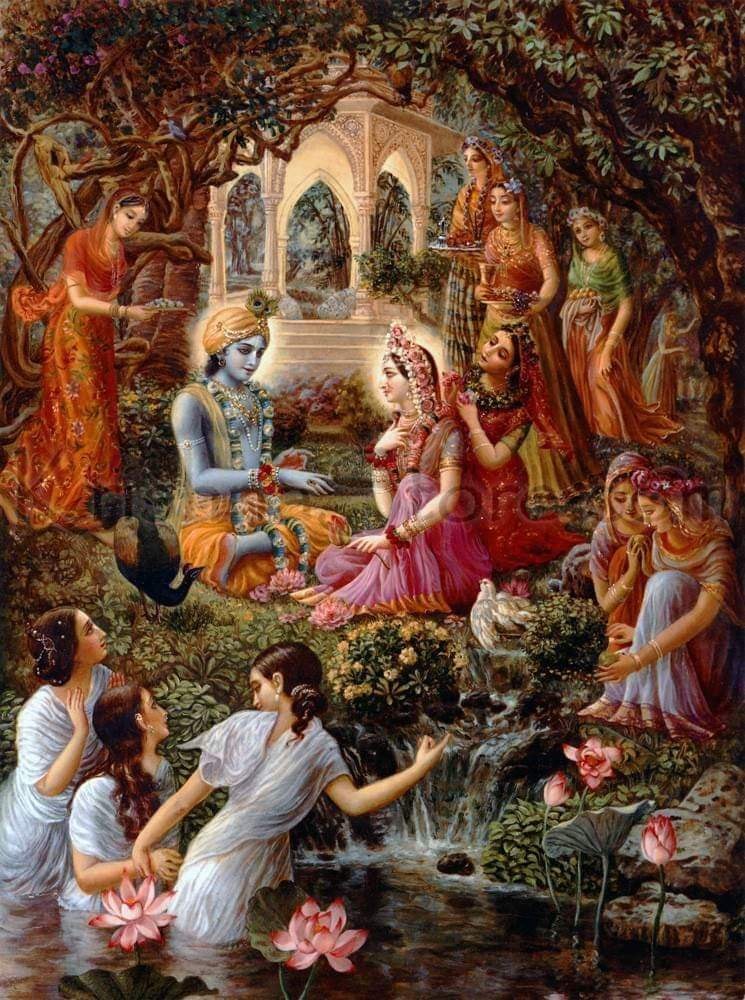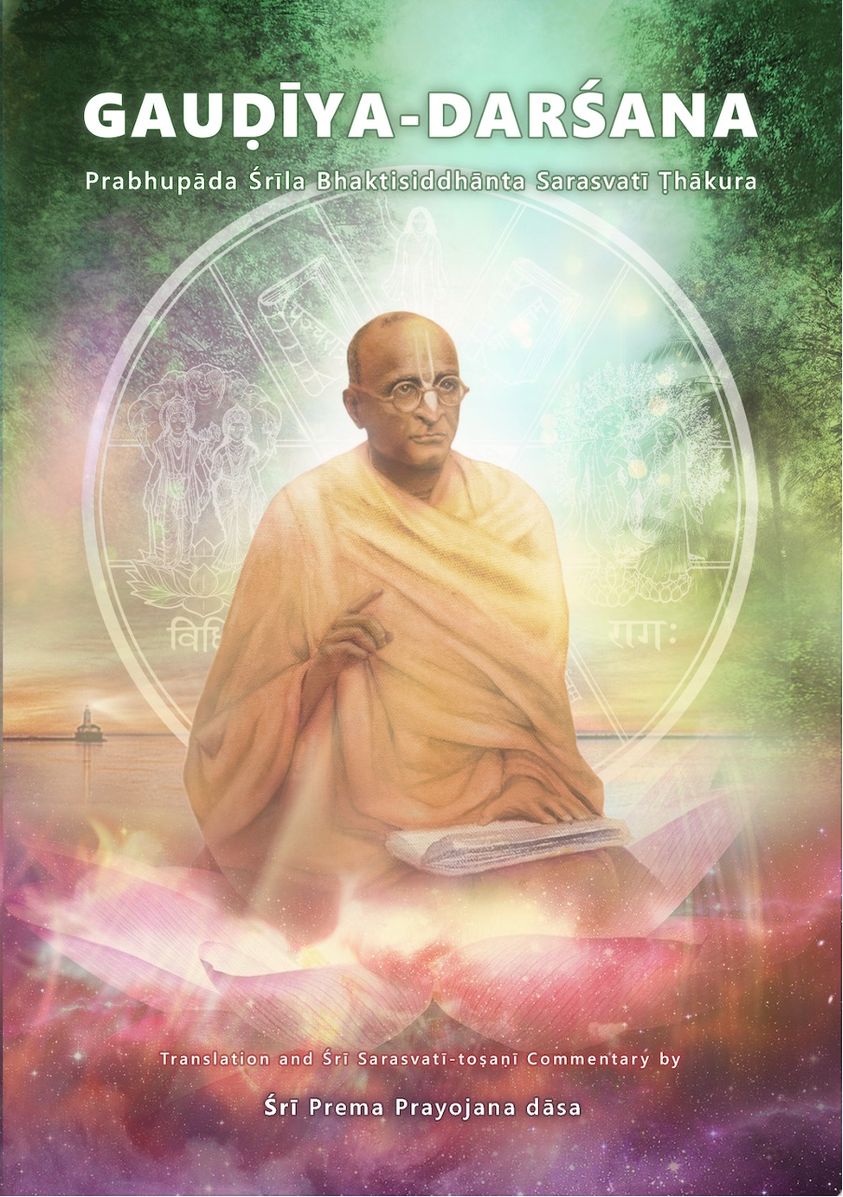Self Control
Related Articles
Controlling The Mind
MAIN ARTICLE
The Thought Of The Day 26th March 2012
When one who is self-controlled achieves happiness all his miseries are dispelled. As a result, the intelligence of such a contented person soon becomes fixed in attaining his desired goal.
The above text was taken from the Bhagavad Gita
by Srila BV Narayana Maharaja
Chapter 2 Sloka 65 Page 161
Sanskrit
prasade sarva-duhkhanam / hanir asyopajayate
prasanna-cetaso hy asu / buddhih paryavatishthate
Word for word
prasadeon attainment of mercy; hanihdiminution; sarva duhkhanamof all miseries; upajayatetakes place; buddhih (the) intelligence; asyaof such a man; prasanna-cetasah whose mind is content; hicertainly; asuvery soon; paryavatishthatebecomes fixed in all respects.
Translation
When one who is self-controlled achieves happiness all his miseries are dispelled. As a result, the intelligence of such a contented person soon becomes fixed in attaining his desired goal.
SARARTHA-VARSHINI
BY SRILA VISVANATHA CAKRAVARTI THAKURA
Buddhih paryavatishthate means that, in all respects his intelligence becomes stable and fixed on the desired goal. Thus, he remains happy whether he accepts sense objects or not. Prasanna-cetasah indicates that it should be understood that internal happiness will come only from bhakti, because without bhakti the heart cannot become pleased. This has been explained vividly in the First Canto of Srimad-Bhagavatam, which describes how Vyasadevas mind was not happy, even after he had compiled Vedantasutra. However, after he followed the instructions of Sri Narada, his heart became blissful through the exclusive practice of Bhakti.
SARARTHA-VARSHINI PRAKASIKA-VRITTI
BY SRILA BHAKTIVEDANTA NARAYANA MAHARAJA
The heart can be pleased only by bhakti, rendering loving devotional service to Sri Bhagavan. Bhakti removes all miseries, and in a very short period a person who practises bhakti easily becomes fully fixed at the lotus feet of his ishtadeva. This is also described in the dialogue between Vyasa and Narada in Srimad-Bhagavatam from dhrita-vratena hi maya (1.4.28) to yamadibhir yoga-pathaih kama-lobha-hato muhuh (1.6.35). When the sadhaka practises yama and niyama on the path of ashtanga-yoga (the eight stages of yoga), the mind, which is always under the control of lust and greed, attains a certain level of happiness and peace. However, there is no comparison between this and the immediate and immense pleasure attained by service to Bhagavan Sri Krishna (SrimadBhagavatam 1.6.35)
In this regard, it is worth deliberating on the examples of Saubhari Rishi, Yayati Maharaja, Visvamitra Muni and others. Saubhari Rishi was still unable to control his mind even after performing austerities within the water of the Yamuna for ten thousand years. His mind became agitated by seeing fish engaging in sex life. He emerged from the water to marry the fifty daughters of Mandhata Maharaja, but his lust still remained unsatiated even after enjoying with them by expanding himself into fifty forms. Eventually, he attained his desired goal by controlling his senses through the worship of Sri Bhagavan.
Yayati Maharaja was not able to control his mind, despite various endeavours. He exchanged his old age for the youth of his son Puru, and enjoyed for many years, but his lusty desires increased, just as ghee nourishes fire. He could only attain peace when he had finally fixed his mind in the worship of Bhagavan.
Although Visvamitra Muni engaged in severe austerities by practising sama (mind control) and dama (sense control) and subduing his senses, he still abandoned his austerities just upon hearing Menakas ankle bells and became absorbed in lustful activity. His agitated mind eventually found peace only in the worship of Bhagavan.
This conclusion is specifically verified in the dialogue between Vyasa and Narada in the First Canto of Srimad-Bhagavatam. Veda-Vyasa had already divided the Vedas into four parts and had compiled Mahabharata, the Puranas and Vedanta
sutra and although he had described knowledge of dharma and other such topics for the information of people in general, his mind remained unsatisfied. Unable to understand why, he inquired from his spiritual master, Devarshi Narada.
Sri Narada answered:
sri narada uvaca
bhavatanudita-prayam / yaso bhagavato malam
yenaivasau na tushyeta / manye tad darsanam khilam
yatha dharmadayas cartha / muni-varyanukirtitah
na tatha vasudevasya / mahima hy anuvarnitah
Srimad-Bhagavatam 1.5.8-9
O great sage, you have described the processes of dharma and jnana, which I consider to be incomplete and insignificant, but you have not clearly described the topics of Sri Bhagavans most purifying pastimes and their glories. Sri Bhagavan cannot be pleased unless one glorifies such pastimes, which manifest themselves in the purified mind by the performance of bhakti.
Following the instructions of Narada Muni, by performing bhakti-yoga, Vyasa was able to see in his pure heart all of Sri Krishnas beautiful pastimes, full of aisvarya (opulence) and madhurya (sweetness). Srimad-Bhagavatam consists of the activities of Sri Krishna which Vyasa realised in samadhi.
yasyam vai sruyamanayam / krishne parama-purushe
bhaktir utpadyate pumsah / soka-moha-bhayapaha
Srimad-Bhagavatam 1.7.7
By the culture of hearing and following this Srimad-Bhagavatam, bhakti to Vrajendra-nandana Sri Krishna immediately manifests in the heart, dispelling lamentation, delusion and fear. Only then is Sri Krishna captured in the heart of such a bhakta.











